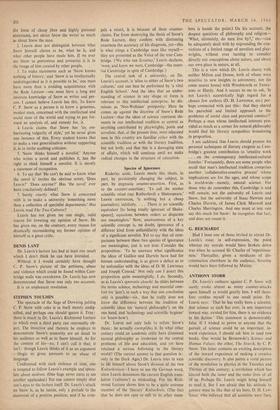STEPHEN TOULMIN The spectacle of the Sage of Downing pelting
C. P. Snow with coke is in itself merely undig- nified, and perhaps one should' ignore it. True: there is much in Dr. Leavis's Richmond Lecture to which even a third party can reasonably ob- ject. The invective and rhetoric he employs to demonstrate Snow's nonentity are an insult to his audience as well as to Snow himself. As for the content of his—no, I can't call it that; it isn't: though Leavis thinks of it as an argument —illogic so gross amounts to an abuse of language.
Confronted with such violence of tone, one is tempted to follow Leavis's example and specu- late about motives. (One Sage never cares to see another applauded.) Yet one cannot simply shut one's eyes to the lecture itself. Dr. Leavis's attack on Snow is, as he insists, only a prelude to the statement of a positive position; and if he corn- pels a retort, it is because of these counter- claims. Far from destroying the thesis of Snow's Rede Lecture, they confirm with distressing exactness the accuracy of his diagnosis, yet—this is what stings a Cambridge man like myself— they are presented as the Voice of the true Cam- bridge. ('We who ran Scrutiny,' Leavis declares, 'were, and knew we were, Cambridge—the essen- tial Cambridge in spite of Cambridge.') The central task of a university, on Dr. Leavis's account, is 'alien to either of Snow's two cultures,' and can best be performed by 'a vital English School.' And the idea that an under- standing of science in any shape or form is relevant to this intellectual enterprise, he dis- misses as 'Neo-Wellsian' pomposity. Here he comes up against the doctrine of Snow's Rede Lecture—that the ideas of science represent ele- ments in our intellectual tradition as central as anything contributed by playwrights, poets and novelists; that, at the present time, most educated men in this country are familiar either with the scientific tradition or with the literary tradition, but not both; and that this is a damaging state of affairs, which will continue until we make radical changes in the structure of education.
Species of Ignorance Ruderies aside, Leavis meets this thesis, in part, by persistently changing the subject, in part, by dogmatic counter-assertion. First, as to the counter-assertion: To call the master scientific mind (say Rutherford) a Shakespeare,' Leavis announces, 'is nothing but a cheap journalistic infelicity. . . . There is no scientific equivalent [to being totally ignorant of Shake- speare]; equations between orders so disparate are meaningless.' Now, unawareness of a key scientific concept is, no doubt, ignorance of a different kind from unfamiliarity with the ideas of a significant novelist. Yet to say that all com- parisons between these two species of ignorance are meaningless, just is not true. Consider the proposition: `To be unaware what significance the ideas of Galileo and Darwin have had for human understanding, is as grave a defect as to be unfamiliar with the ideas of D. H. Lawrence and Joseph Conrad.' Not only can I assert this proposition quite meaningfully. I do. Secondly, as to Leavis's ignoratio elenchi: he slides between the terms science, technology and material com- fort (or 'jam'), in such a way that one conclusion only is possible—viz., that he really does not know the difference between the tradition of scientific ideas (or 'natural philosophy'), on the one hand, and 'technology and scientific hygiene' (or 'know-how').
Dr. Leavis not only' fails to refute Snow's thesis: he actually exemplifies it. In what other century could an academic critic have dismissed natural philosophy as irrelevant to the central problems of life and education, and yet have retained a serious following in the literary world? (The correct answer to that question is: only in the Dark Ages.) Dr. Leavis tries in vain to lift himself above Snow's division of the two Kulturkreisen—I have to use the German word, since Leavis denounces the current English trans- lation ('cultures') as misleading. For his Rich- mond Lecture shows him to be a quite extreme member of the 'literary' Kulturkreis. (The fact that he does not care to talk to its other mem- bers is beside the point.) On his account, the deepest questions of philosophy and religion— `What, ultimately, do men live by?,' etc.—can be adequately dealt with by expounding the con- victions of a limited range of novelists and play- wrights, without ever turning to consider directly our conceptions about nature, and about our own place in nature, at all.
This is a view which Dr. Leavis shares with neither Milton and Donne, both of whom were sensitive to new insights in astronomy, nor (to come nearer home) with Wordsworth or Tenny- sons or Hardy. And it occurs to me to ask, 'Is not Leavis's eccentrically high regard for a chosen few authors (D. H. Lawrence, etc.) per- haps connected with just this: that they shared his parochial and limited approach to the problems of social class and personal conduct?' Perhaps a man whose intellectual interests pro- vided as much as a corner for natural philosophy would find his literary sympathies broadening in proportion.
I am saddened that Leavis should present his personal techniques of literary exegesis as Cam- bridge's greatest contribution to 'creative work . . . on the contemporary intellectual-cultural frontier.' Fortunately, there are some people who recall that man's intellectual tradition comprises another 'collaborative-creative process' whose implications are for the ages, and whose scope is world-wide—namely, natural science. For those who do remember this, Cambridge is and will remain, not the university of Leavis and Snow, but the university of Isaac Newton and Charles Darwin, of James Clerk Maxwell and Charles Sherrington. And one must at any rate say this much for Snow: he recognises that fact, and does not resent it.


































 Previous page
Previous page